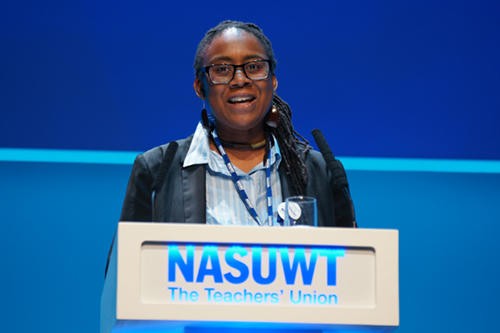By Gavin Mackintosh-
The contribution of black people to British history and culture should be taught in all subjects at school, a union conference has been told.
The NASUWT teaching union’s annual conference heard that the national curriculum is “lacking” and some teachers have taken it into their own hands to “decolonise their classrooms”.
A motion passed at the conference called for education to equip all children to understand and respect a variety of histories, cultures and traditions.
It noted that the national curriculum should “reflect, respect and value the contributions of all communities” that have contributed to building the UK.
Calls to decolonise the curriculum and boost diversity in schools, colleges and universities have gained momentum over the past year following protests in support of the Black Lives Matter (BLM) movement.
Critics say the national curriculum is lacking and the fact that our exam boards don’t value and reward the diversity of content is an issue.
Oxford teacher Michelle Codrington-Rogers, (pictured)who was the first black National President of the NASUWT is leading the call for a more inclusive curriculum.
The 42-year-old, who teaches citizenship at The Cherwell School in Oxford, said society had to look at how it treated children and teachers and not lose sight of what education was for.
“For me education is about empowering the next generation to be able to see how we can make the world better. It is about how we move forward as a society and as a species,” she said. she added: “We have a responsibility to be inclusive for all of our students and this starts with unensuring that there is black visibility for our children and young people. Not just black children, but all children.
“It is crucial to recognise that black history is all of our history.”
Ms Codrington-Rogers said: “Many schools and our colleagues focus on and centralise the pain and suffering of communities, such as slavery and partition, and that does have long-lasting effects on the students who are taught their heritage is only based in pain.”
She told the conference: “The national curriculum is lacking and the fact that our exam boards don’t value and reward the diversity of content is an issue.”
She said Government curriculum reviews centring on the classics “over and over again above diverse voices, for example in the English curriculum, speaks volumes”.
I’ve worked very hard already to decolonise the curriculum. I am able to do this because the current national curriculum allows me the freedom to choose what is important to teachMs Codrington-Rogers, a citizenship teacher from Oxford, said: “All subjects need to ensure that there is inclusivity in their teaching.
“That there is black visibility in design tech and modern foreign languages, science and English, music and geography, art and maths, computer science and citizenship, food technology and drama.
“All subjects have a responsibility to change the narrative that black people have only got a history of enslavement and colonisation.
“We built the pyramids, developed modern numbers, built universities. Our ancestors were philosophers, scientists, military strategists, authors, writers, activists and so much more.”
Her comments came after two Commons select committees have considered calls to decolonise and diversify the curriculum after hundreds of thousands of people signed petitions on the issue.
Delegates voted for the executive to publish materials and resources on decolonising the curriculum and to lobby the Government to secure “inclusive curricular entitlements”.
But Luke Akhurst, a history teacher from Leicestershire, who spoke against the motion at the conference, warned that the policy could set a “dangerous precedent” by allowing politicians to legislate what history can be taught.
He said: “I’ve worked very hard already to decolonise the curriculum. I am able to do this because the current national curriculum allows me the freedom to choose what is important to teach.”
During the debate, Andrea Welter, an NASUWT member from Walsall, acknowledged that some teachers have already started the journey of decolonising the curriculum, but she argued “we need a collective”.
Paulette Ennever, a food tech teacher in Ealing, London, said she “decolonises” her lessons so students are aware of the origins of the food they eat.
But she warned that black students still do not see themselves as “innovators, doctors or writers” in the history curriculum and some textbooks “still use colonial views and language”.
The motion called on the executive to engage with teacher training providers to embed anti-racist teaching, and it applauded the contribution of the BLM movement in highlighting “racial injustice”.
Dr Patrick Roach, general secretary of the NASUWT, said: “The Black Lives Matter movement has dramatically highlighted racial injustice and inequality. However, we must ensure that these momentous protests lead to long-lasting and tangible progress within our society.
“Education has a vital role to play in teaching future generations about our country’s shared history, promoting equality, inclusion and respect for others, and in teaching about the historical injustices that continue to drive all forms of discrimination and extremism in our society today.
“The NASUWT is calling for the decolonising of curriculums across the UK. We will be lobbying governments to secure inclusive curriculum frameworks, which recognise and celebrate the contributions of all citizens.”




